As the race towards electrification accelerates, the automotive landscape is awash with compelling choices in the electric SUV segment. Two noteworthy contenders are the Nissan Ariya and the Skoda Enyaq. Both vehicles boast innovative technology, impressive performance metrics, and competitive range offerings, but how do they stack up against each other? Let’s delve into a detailed comparison.
Nissan Ariya vs Skoda Enyaq - Differences and prices compared
Compare performance (435 HP vs 340 HP), boot space and price (37300 £ vs 41900 £ ) at a glance. Find out which car is the better choice for you – Nissan Ariya or Skoda Enyaq?
Powertrain and Performance
The Nissan Ariya offers an array of power options with configurations ranging from 218 HP to a robust 435 HP, catering to varying driving preferences. Its electric range is equally impressive, with options reaching up to 531 km, depending on the battery capacity of 63 kWh or 87 kWh. The Ariya accelerates from 0 to 100 km/h in as little as 5 seconds with its most powerful variant, providing an exhilarating driving experience for enthusiasts.
On the other hand, the Skoda Enyaq provides a slightly simplified powertrain lineup, with maximum outputs of 286 HP and 340 HP. Despite lower horsepower figures compared to the Ariya, the Enyaq achieves remarkable efficiency, with energy consumption as low as 14.6 kWh/100 km. It also offers an electric range of up to 573 km, showcasing its prowess in long-distance driving.
Design and Dimensions
In terms of physical dimensions, the Nissan Ariya measures 4595 mm in length, 1850 mm in width, and 1650 mm in height. It presents a sleek, contemporary design that is distinctly Nissan while providing ample trunk space of 468 liters. The interior is designed to prioritize comfort and technology, providing a pleasant experience for passengers.
The Skoda Enyaq is slightly larger with measurements of 4649 mm or 4653 mm in length, 1879 mm in width, and a height of 1620-1621 mm. Its cargo capacity surpasses that of the Ariya, with up to 585 liters available, making it more practical for families or those needing extra storage. Skoda’s design ethos offers a spacious and functional interior filled with high-quality materials and innovative technology integrations.
Battery and Charging Innovations
The Ariya's battery options provide flexibility—bigger batteries for longer ranges or smaller options for lighter weights and improved efficiency. Its maximum charging speed can reach 130 kW, allowing for rapid charging in less time. Key technology features include advanced thermal management systems that optimize battery performance across various conditions.
Conversely, the Skoda Enyaq excels in efficiency, positioned as an eco-friendly option with a lower consumption rate. Its battery capacity holds at 77 kWh, striking a balance between performance and sustainability. The Enyaq supports ultra-fast charging up to 125 kW, ensuring owners can quickly replenish their battery on long trips, an influential factor for many electric vehicle buyers.
Tech Features and Safety
When it comes to technology, both models pack an impressive arsenal. The Nissan Ariya is equipped with the latest Nissan Intelligent Mobility features, including ProPILOT Assist for semi-autonomous driving capability. The digital cockpit, with a large screen integrated into the dashboard, keeps drivers connected and informed with navigational aids and vehicle health monitoring.
The Skoda Enyaq, on the other hand, also prioritizes tech-savvy drivers with its innovative infotainment system. It features a larger central display, intuitive controls, and a suite of driver-assistance features that ensure safety and convenience, across varying driving scenarios.
Conclusion: Which SUV Reigns Supreme?
Both the Nissan Ariya and the Skoda Enyaq cater to distinct market segments but remarkably focus on similar sustainability aims. The Ariya shines on the performance end with a diverse range of power outputs, while the Enyaq offers superior efficiency and cargo space. Ultimately, the choice comes down to individual priorities—whether one values raw power and driving excitement or practicality and range efficiency. As the electric vehicle segment continues to evolve, both SUVs are impressive players showcasing the future of automotive innovation.
Video - Skoda Enyaq
Here’s where it gets real: The technical differences in detail
Costs and Efficiency:
Price and efficiency are often the first things buyers look at. Here it becomes clear which model has the long-term edge – whether at the pump, the plug, or in purchase price.
Nissan Ariya has a slightly advantage in terms of price – it starts at 37300 £ , while the Skoda Enyaq costs 41900 £ . That’s a price difference of around 4637 £.
In terms of energy consumption, the advantage goes to the Skoda Enyaq: with 14.80 kWh per 100 km, it’s a bit more efficient than the Nissan Ariya with 17.70 kWh. That’s a difference of about 2.90 kWh.
As for electric range, the Skoda Enyaq performs barely noticeable better – achieving up to 587 km, about 56 km more than the Nissan Ariya.
Engine and Performance:
Under the bonnet, it becomes clear which model is tuned for sportiness and which one takes the lead when you hit the accelerator.
When it comes to engine power, the Nissan Ariya has a evident edge – offering 435 HP compared to 340 HP. That’s roughly 95 HP more horsepower.
In acceleration from 0 to 100 km/h, the Nissan Ariya is slight quicker – completing the sprint in 5 s, while the Skoda Enyaq takes 5.40 s. That’s about 0.40 s faster.
In terms of top speed, the Nissan Ariya performs slight better – reaching 200 km/h, while the Skoda Enyaq tops out at 180 km/h. The difference is around 20 km/h.
There’s also a difference in torque: Skoda Enyaq pulls slightly stronger with 679 Nm compared to 600 Nm. That’s about 79 Nm difference.
Space and Everyday Use:
Cabin size, boot volume and payload all play a role in everyday practicality. Here, comfort and flexibility make the difference.
Both vehicles offer seating for 5 people.
In curb weight, Nissan Ariya is to a small extent lighter – 1980 kg compared to 2179 kg. The difference is around 199 kg.
In terms of boot space, the Skoda Enyaq offers somewhat more room – 585 L compared to 468 L. That’s a difference of about 117 L.
In maximum load capacity, the Skoda Enyaq performs evident better – up to 1710 L, which is about 360 L more than the Nissan Ariya.
When it comes to payload, Skoda Enyaq a bit takes the win – 489 kg compared to 420 kg. That’s a difference of about 69 kg.
Who wins the race in the data check?
The Skoda Enyaq is narrowly ahead in the objective data comparison.
This result only shows which model scores more points on paper – not which of the two cars feels right for you.
Costs and Consumption
View detailed analysis
Engine and Performance
View detailed analysis
Dimensions and Body
View detailed analysis
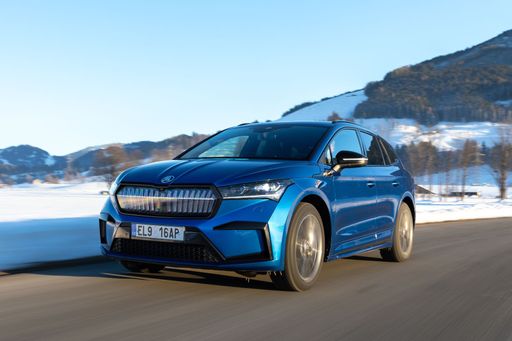
Skoda Enyaq
Nissan Ariya
The Nissan Ariya wraps futuristic, sculpted styling around a calm, high-tech cabin, making the switch to electric feel surprisingly easy and grown-up. It’s a comfortable, sensible EV that favors everyday usability and clever packaging over headline-grabbing theatrics — ideal for buyers who want an elegant, low-fuss electric car without the ego.
details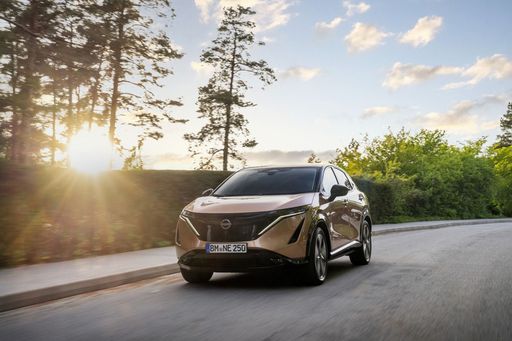
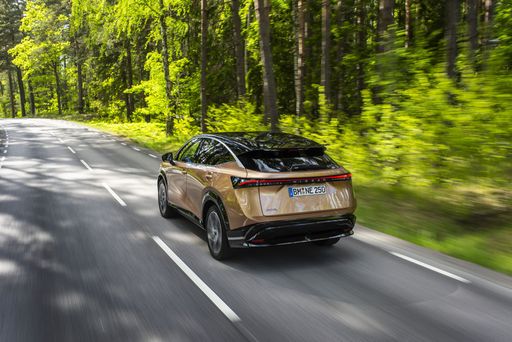
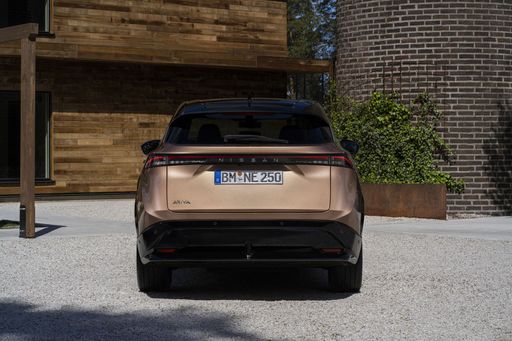
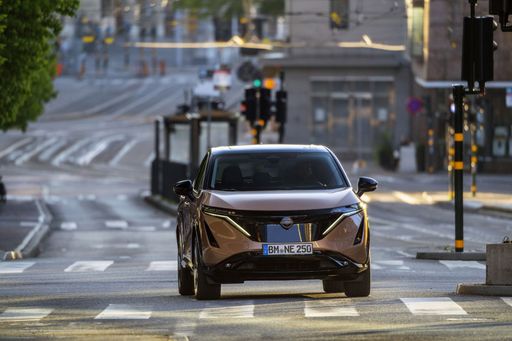
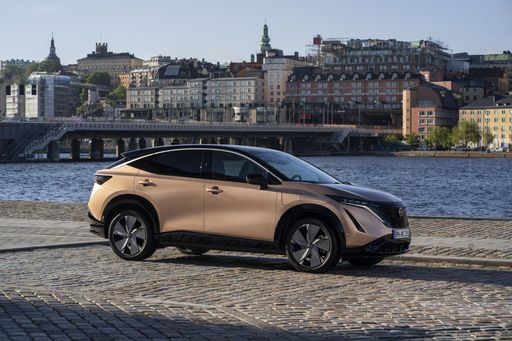
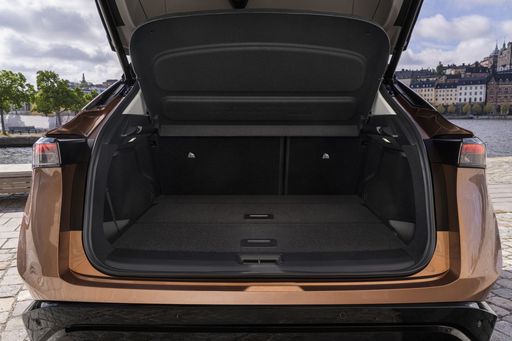
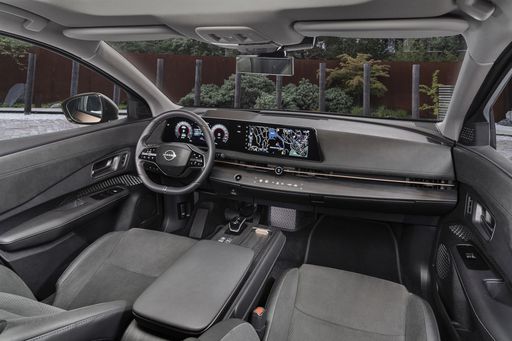
Skoda Enyaq
The Skoda Enyaq is a cleverly packaged electric SUV that blends roomy, pragmatic family space with clean, Czech design and sensible value. On the road it’s unshowy but composed, offering serene electric performance and easy-to-use tech — the kind of car that makes daily life smoother without trying too hard.
details

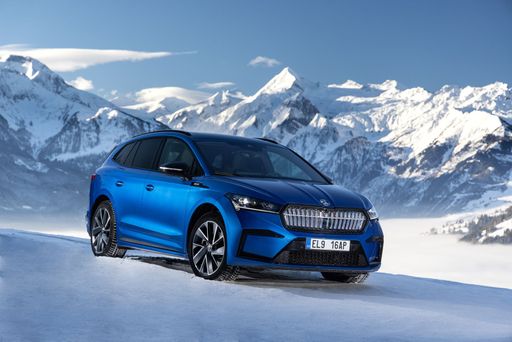

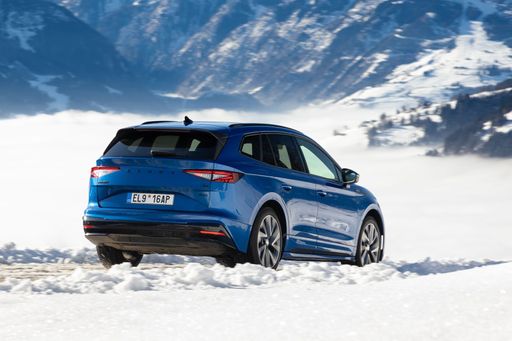
Costs and Consumption |
|
|---|---|
|
Price
37300 - 54800 £
|
Price
41900 - 52200 £
|
|
Consumption L/100km
-
|
Consumption L/100km
-
|
|
Consumption kWh/100km
17.7 - 24.5 kWh
|
Consumption kWh/100km
14.8 - 16.2 kWh
|
|
Electric Range
402 - 531 km
|
Electric Range
538 - 587 km
|
|
Battery Capacity
63 - 87 kWh
|
Battery Capacity
77 kWh
|
|
co2
0 g/km
|
co2
0 g/km
|
|
Fuel tank capacity
-
|
Fuel tank capacity
-
|
Dimensions and Body |
|
|---|---|
|
Body Type
SUV
|
Body Type
SUV
|
|
Seats
5
|
Seats
5
|
|
Doors
5
|
Doors
5
|
|
Curb weight
1980 - 2277 kg
|
Curb weight
2179 - 2293 kg
|
|
Trunk capacity
415 - 468 L
|
Trunk capacity
570 - 585 L
|
|
Length
4595 mm
|
Length
4658 mm
|
|
Width
1850 mm
|
Width
1879 mm
|
|
Height
1650 mm
|
Height
1620 - 1621 mm
|
|
Max trunk capacity
1280 - 1350 L
|
Max trunk capacity
1610 - 1710 L
|
|
Payload
363 - 420 kg
|
Payload
443 - 489 kg
|
Engine and Performance |
|
|---|---|
|
Engine Type
Electric
|
Engine Type
Electric
|
|
Transmission
Automatic
|
Transmission
Automatic
|
|
Transmission Detail
Reduction Gearbox
|
Transmission Detail
Reduction Gearbox
|
|
Drive Type
Front-Wheel Drive, All-Wheel Drive
|
Drive Type
Rear-Wheel Drive, All-Wheel Drive
|
|
Power HP
218 - 435 HP
|
Power HP
286 - 340 HP
|
|
Acceleration 0-100km/h
5 - 7.6 s
|
Acceleration 0-100km/h
5.4 - 6.7 s
|
|
Max Speed
160 - 200 km/h
|
Max Speed
180 km/h
|
|
Torque
300 - 600 Nm
|
Torque
545 - 679 Nm
|
|
Number of Cylinders
-
|
Number of Cylinders
-
|
|
Power kW
160 - 320 kW
|
Power kW
210 - 250 kW
|
|
Engine capacity
-
|
Engine capacity
-
|
General |
|
|---|---|
|
Model Year
2022 - 2025
|
Model Year
2025
|
|
CO2 Efficiency Class
A
|
CO2 Efficiency Class
A
|
|
Brand
Nissan
|
Brand
Skoda
|
What drivetrain options does the Nissan Ariya have?
The Nissan Ariya is offered with Front-Wheel Drive or All-Wheel Drive.
